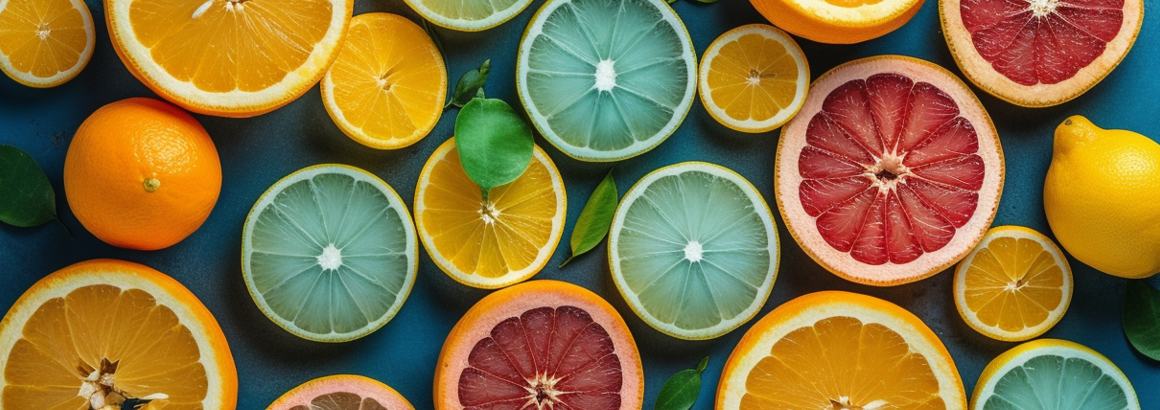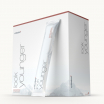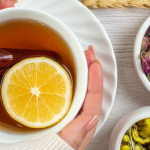Fruits Highest in Collagen-Boosting Vitamins
Published:
Categories: CollagenCollagen is the most abundant protein in the human body. It provides structure and elasticity to the skin, strengthens bones, supports joints, and promotes gut health. As we age, collagen production naturally declines, leading to common signs of aging like wrinkles, sagging skin, and joint pain. Thankfully, consuming vitamin-rich fruits can help boost collagen synthesis and maintain youthful, healthy tissues. This article will explore the top fruits highest in vitamins and antioxidants that support natural collagen production.
Contents:
- The Importance of Collagen for Health
- Vitamin C - The Superstar for Collagen Production
- Vitamin A Supports Collagen Production
- Anthocyanins Protect and Boost Collagen
- Copper Stimulates Collagen Formation
- Zinc Boosts Collagen Synthesis
- Vitamin E Protects Collagen Fibers
- Selenium Prevents Collagen Breakdown
- Lycopene Boosts Collagen Production
- Beta-Carotene Supports Healthy Skin
- Additional Collagen-Boosting Foods
- Conclusion
- Q: What are collagen-boosting vitamins?
- Q: Which fruits are highest in collagen-boosting vitamins?
- Q: Can collagen supplements help increase collagen levels?
- Q: Are leafy greens a good source of collagen?
- Q: What are the best collagen-rich foods to include in your diet?
- Q: Can foods high in collagen help boost collagen naturally?
- Q: Can a healthy diet help increase collagen levels?
- Q: Can foods like oranges and red bell peppers help boost collagen?
- Q: What other foods can help boost collagen naturally?
- Q: Can collagen be sourced from other foods or supplements?

The Importance of Collagen for Health
Collagen is the structural protein that forms connective fibers throughout the body. Collagen makes up 70-80% of our skin and comprises the majority of bone, tendon, cartilage, and ligament tissues [1]. It provides strength and flexibility to connective tissues. Collagen also plays a vital role in wound healing and tissue repair.
As we age, collagen production declines starting in our mid-20s. This leads to common signs of aging like wrinkles, sagging skin, stiff joints, brittle bones, and weakened muscles [2]. Boosting collagen production can help maintain youthful skin, strong joints, and healthy connective tissues. Consuming fruits rich in vitamins and antioxidants that support collagen synthesis is an easy way to promote healthy levels of this vital protein.
Vitamin C - The Superstar for Collagen Production
Vitamin C is essential for collagen formation in the body. It serves as a cofactor for enzymes that build and stabilize collagen fibers like procollagen and lysyl hydroxylase [3]. Vitamin C also protects existing collagen from damage caused by free radicals and UV exposure [4]. Loading up on vitamin C-rich fruits can help boost collagen synthesis and maintain youthful, wrinkle-free skin.
Top Fruits High in Vitamin C
- Citrus Fruits - Oranges, grapefruit, lemons, limes, and tangerines are packed with vitamin C. Just one medium orange provides over 100% of the daily recommended vitamin C intake [5].
- Kiwi - Raw kiwi provides 130% of the daily value for vitamin C per cup. Enjoy kiwi slices in fruit salads or smoothies [6].
- Strawberries - One cup of raw strawberries has 150% of the daily vitamin C requirement. Snack on fresh berries or add to yogurt and oatmeal [7].
- Mango - A cup of mango cubes provides 100% of the RDI for vitamin C. Mangoes can be enjoyed fresh, in salsas, or blended into smoothies.
- Papaya - One papaya fruit supplies over 200% of the daily vitamin C requirement. Papaya makes a delicious and nutritious breakfast or snack [8].
- Bell Peppers - Red bell peppers are one of the highest vegetable sources of vitamin C, providing 317% of the RDI per cup. All colors of bell peppers can boost your collagen intake [9].
Other Vitamin C-Rich Fruits and Veggies
Pineapple, cantaloupe, guava, tomatoes, broccoli, cauliflower, Brussels sprouts, spinach, and kale are also excellent sources of vitamin C. Aim for at least one serving of vitamin C-rich produce with each meal and snack.
Vitamin A Supports Collagen Production
Vitamin A is essential for collagen synthesis. It stimulates fibroblasts, the cells that produce collagen fibers [10]. Vitamin A also protects existing collagen from UV damage caused by sun exposure [11]. Enjoying fruits and vegetables high in vitamin A promotes healthy collagen levels.
Top Produce Sources of Vitamin A
- Sweet Potatoes - Just one medium baked sweet potato provides over 700% of the daily vitamin A requirement [12].
- Carrots - One large carrot has over 400% of the RDI of vitamin A. Enjoy raw, cooked, or blended into juices and smoothies [13].
- Spinach - A cup of cooked spinach provides over 50% of the daily vitamin A intake. Add spinach to omelets, pastas, and soups [14].
- Cantaloupe - One cup of cantaloupe offers 135% of the RDI for vitamin A. Enjoy melon at breakfast or as a refreshing snack [15].
- Mango - A cup of mango cubes provides over 50% of the daily vitamin A requirement. Add mango to fruit salads, salsas, and smoothies.
- Kale - Just one cup of cooked kale offers 360% of the RDI for vitamin A. Kale is a collagen-boosting superfood!
Other Produce High in Vitamin A
Broccoli, red bell peppers, apricots, tomatoes, and pumpkin are also excellent sources of vitamin A. Yes, you are correct. Broccoli, red bell peppers, apricots, tomatoes, and pumpkin are indeed excellent sources of vitamin A.
Anthocyanins Protect and Boost Collagen
Anthocyanins are antioxidant plant pigments that give berries and certain fruits their bright red and blue hues. Studies show anthocyanins protect collagen fibers from free radical damage that leads to aging [16]. Anthocyanins also boost production of collagen and hyaluronic acid in the skin [17]. Loading up on anthocyanin-rich fruits helps maintain youthful, wrinkle-free skin.
Top Fruits High in Anthocyanins
- Strawberries - Strawberries contain the anthocyanin pelargonidin which research shows protects and restores collagen [18].
- Blueberries - Blueberries are rich in anthocyanins like malvidin and delphinium. Just one cup provides a powerful dose of antioxidants.
- Blackberries - Blackberries contain cyanidin-3-glucoside, an anthocyanin that helps inhibit collagen breakdown [19].
- Cherries - Cherries are packed with anthocyanins like cyanidin and pelargonidin that boost collagen. Enjoy them fresh or frozen.
- Raspberries - Raspberries contain several collagen-protecting anthocyanins including cyanidin. Add them fresh or frozen to yogurt, oatmeal, and smoothies.
- Red Cabbage - Red cabbage serves up 36 different anthocyanins per cup including cyanidin and peonidin [20].
Other Anthocyanin-Rich Foods
Eggplant, purple potatoes, red onions, and purple grapes also supply collagen-boosting anthocyanins.
Copper Stimulates Collagen Formation
Copper is an essential mineral that serves as a cofactor for collagen cross-linking enzymes like lysyl oxidase [21]. Cross-linking gives collagen fibers their strength and flexibility. Copper also acts as an antioxidant, protecting existing collagen from free radical damage [22]. Enjoying copper-rich foods helps maintain optimal collagen levels.
Top Copper-Rich Foods
- Cashews - Just one ounce of cashews provides 25% of the daily copper requirement. Enjoy cashews raw or roasted as a snack.
- Sunflower Seeds - A 1⁄4 cup of sunflower seeds has over 30% of the RDI for copper. Add sunflower seeds to salads, yogurt, and muffins.
- Mushrooms - Varieties like shiitake, cremini, and portobello are excellent sources of copper. Sauté mushrooms to add to omelets, pasta, and steak.
- Dark Chocolate - A 1.5 ounce bar of dark chocolate provides 15% of the daily copper needs. Look for chocolate with at least 70% cocoa.
- Avocados - One medium avocado has 12% of the RDI for copper. Enjoy avocado slices on sandwiches or mashed on toast.
- Asparagus - Six spears of asparagus offer 10% of the daily copper requirement. Roast or sauté asparagus as a healthy side dish.
Other Copper-Rich Foods
Sesame seeds, turnip greens, shitake mushrooms, and sun-dried tomatoes are also great sources of copper.
Zinc Boosts Collagen Synthesis
Zinc plays an important role in regulating collagen synthesis. It acts as a cofactor for enzymes involved in cross-linking collagen fibers [23]. Zinc also helps repair damaged collagen and promotes skin cell renewal [24]. Foods high in zinc support healthy collagen production.
Top Zinc-Rich Foods
- Pumpkin Seeds - 1⁄4 cup of pumpkin seeds provides nearly 50% of the daily zinc needs. Enjoy pumpkin seeds raw as a snack or toasted on salads.
- Cashews - An ounce of cashews has 15% of the RDI for zinc. Snack on cashews or add them to trail mixes.
- Chickpeas - One cup of cooked chickpeas provides about 25% of the daily zinc requirement. Chickpeas are perfect for soups, salads, and veggie burgers.
- Oatmeal - A 1⁄2 cup serving of oats contains 15% of the daily zinc. Enjoy oatmeal topped with fruit for breakfast.
- Mushrooms - Varieties like shiitake and portobello are good sources of zinc. Sauté mushrooms as a savory addition to egg dishes.
- Yogurt - One 6-ounce container of yogurt provides 15-25% of the daily zinc needs. Choose unsweetened Greek yogurt for extra protein.
Other Zinc-Rich Foods
Beef, pumpkin seeds, lentils, spinach, and dark chocolate also supply collagen-boosting zinc.
Vitamin E Protects Collagen Fibers
Vitamin E is a fat-soluble antioxidant that prevents oxidative damage to collagen caused by UV light and pollution [25]. It also works synergistically with vitamin C to boost collagen production [26]. Foods rich in vitamin E help maintain youthful, wrinkle-free skin.
Top Produce Sources of Vitamin E
- Sunflower Seeds - Just 1⁄4 cup of sunflower seeds provides over 90% of the daily vitamin E requirements. Enjoy sunflower seeds raw, roasted, or blended into butter.
- Almonds - A 1⁄4 cup serving of almonds has nearly 50% of the RDI for vitamin E. Snack on raw almonds or add slivered almonds to yogurt and oatmeal.
- Spinach - One cup of cooked spinach provides over 20% of the daily vitamin E needs. Add spinach to soups, pastas, and egg dishes.
- Avocado - One medium avocado has 25% of the RDI for vitamin E. Enjoy avocado slices on sandwiches and in salads.
- Kiwi - A cup of sliced kiwi provides 15% of the daily vitamin E. Kiwis add vitamin C and E to fruit salads and smoothies.
- Broccoli - One cup of cooked broccoli offers 10% of the daily vitamin E requirement. Enjoy broccoli steamed, roasted or raw with dip.
Other Vitamin E Food Sources
Asparagus, red peppers, mango, and tomatoes are also excellent sources of collagen-protecting vitamin E.
Selenium Prevents Collagen Breakdown
Selenium is a trace mineral that helps preserve existing collagen and protects against UV damage [27]. It acts as an antioxidant and immune booster. Enjoying selenium-rich foods helps maintain youthful, healthy skin.
Top Food Sources of Selenium
- Brazil Nuts - Just one Brazil nut provides 100% of the daily selenium requirement. Enjoy a small handful for a potent antioxidant boost.
- Tuna - A 3-ounce serving of tuna offers over 50% of the RDI for selenium. Choose wild caught tuna canned in water.
- Oatmeal - A half-cup of cooked oats contains about 10% of the daily selenium needs. Enjoy oatmeal topped with fruit, flaxseeds, and nuts.
- Brown Rice - One cup of cooked brown rice provides 20% of the daily selenium. Enjoy brown rice tossed with vegetables for a well-rounded, collagen-boosting meal.
- Eggs - One large egg has 15% of the daily selenium requirement. Prepare omelets packed with veggies to start your day right.
- Sunflower Seeds - A quarter cup of sunflower seeds provides nearly 20% of the RDI for selenium. Snack on sunflower seeds or add them to homemade trail mixes.
Other Selenium-Rich Foods
Shiitake mushrooms, spinach, chicken breast, grass-fed beef, and mushrooms are also excellent sources of selenium.
Lycopene Boosts Collagen Production
Lycopene is a bright red plant pigment found in tomatoes, watermelon, pink grapefruit and other red-hued produce. Studies demonstrate lycopene stimulates collagen production and inhibits enzymes that degrade collagen [28]. Enjoying lycopene-rich fruits helps maintain youthful, wrinkle-free skin.
Top Produce Sources of Lycopene
- Tomatoes - Tomatoes are by far the richest source of lycopene. Enjoy sliced tomatoes in salads, salsas, sandwiches, and sauces for a collagen boost.
- Watermelon - Watermelon gets its red color from lycopene. Snack on watermelon at picnics and backyard barbecues during the summer.
- Pink Grapefruit - Pink and red grapefruit pack a potent punch of lycopene. Enjoy cut grapefruit halves for breakfast or in fruit salads.
- Papaya - Papaya fruit provides over 75% of the daily lycopene in just one cup. Add papaya to yogurt bowls and smoothies.
- Guava - One cup of guava pieces supplies 100% of the RDI for lycopene. Guava can be eaten fresh or used in jams, juices, and desserts.
Other Lycopene-Rich Fruits
Red bell peppers, asparagus, red cabbage, apricots and watermelon also provide collagen-boosting lycopene.
Beta-Carotene Supports Healthy Skin
Beta-carotene is an antioxidant that gives certain fruits and veggies their rich orange color. Studies show beta-carotene protects skin from sun damage, supports fibroblast function, and stimulates collagen production [29]. Foods rich in beta-carotene promote youthful, wrinkle-free skin.
Top Produce Sources of Beta-Carotene
- Carrots - One large carrot provides over 600% of the daily beta-carotene needs. Enjoy carrots raw with dip or roasted as a side dish.
- Sweet Potato - A medium baked sweet potato has over 700%
of the RDI for beta-carotene. Top baked sweet potato with Greek yogurt and nuts for a collagen-boosting meal.
- Spinach - One cup of cooked spinach offers 60% of the daily beta-carotene. Add spinach to pastas, soups, salads, and smoothies.
- Cantaloupe - One cup of cantaloupe provides 135% of the daily beta-carotene needs. Enjoy cantaloupe slices alone or in fruit salads.
- Mangoes - A cup of mango pieces packs over 50% of the RDI for beta-carotene. Blend mangoes into smoothies or salsa.
- Broccoli - One cup of cooked broccoli has over 90% of the daily beta-carotene requirement. Roast broccoli florets as a crispy, antioxidant-rich side dish.
Other Produce Rich in Beta-Carotene
Apricots, red bell peppers, kale, turnip greens, and squash also supply skin-beautifying beta-carotene.
Additional Collagen-Boosting Foods
In addition to fruits and vegetables, other foods support collagen production by providing key amino acids like glycine and proline. Enjoying these foods helps maintain optimal levels of healthy collagen.
- Bone broth - Bone broth provides collagen-building blocks like glycine and proline. Sip bone broth alone or use as a base for soups and stews.
- Eggs - Egg whites provide proline and glycine to support collagen synthesis [30].
- Beans - Varieties like kidney, pinto, black, and navy beans offer plant-based proline and glycine. Beans are perfect for soups, dips, and veggie burgers.
- Soy products - Tofu, edamame, tempeh, and soy milk provide vegan sources of proline. Add tofu to stir-fries or snack on edamame.
- Chicken - Chicken is rich in proline, an amino acid vital for collagen production [31]. Choose organic and free-range chicken.
- Wild-caught fish - Cold-water fish like salmon provide glycine and proline. Aim for at least two servings of fish per week.
- Onions and garlic - Onions and garlic boost collagen synthesis [32]. Add them to soups, sautés, roasts, marinades and dressings.
Conclusion
Collagen is the vital structural protein that keeps skin youthful, joints strong, and bones healthy. Consuming fruits and vegetables rich in vitamins C, A, and E, minerals like zinc and copper, and antioxidants like beta-carotene and lycopene helps stimulate natural collagen synthesis in the body. Increased collagen production promotes smooth, wrinkle-free skin, strong bones and muscles, flexible joints, and quicker healing.
Some of the top fruits and vegetables highest in collagen-boosting nutrients include oranges, strawberries, kiwi, carrots, spinach, blueberries, avocados, tomatoes, pumpkin seeds, and broccoli. Aim to fill your plate with vibrantly colored produce at every meal to flood your body with collagen-boosting compounds. Supplement your fruit and veggie intake with collagen-supporting foods like eggs, chicken, fish, beans, nuts, seeds, and garlic.
By regularly consuming nutritious foods that provide key vitamins, minerals, antioxidants, and amino acids, you can help maintain optimal collagen levels and enjoy youthful, healthy skin, joints, bones, and muscles throughout life. Collagen-rich foods paired with other healthy lifestyle factors like exercise, adequate sleep, stress management, and sun protection offer a natural way to keep your body’s collagen stores plentiful.
Q: What are collagen-boosting vitamins?
A: Collagen-boosting vitamins are vitamins that help increase the production of collagen in the body. Collagen is a protein that plays a crucial role in maintaining the health and elasticity of the skin, hair, nails, and connective tissues.
Q: Which fruits are highest in collagen-boosting vitamins?
A: Citrus fruits, such as oranges and lemons, are known to be high in collagen-boosting vitamins. These fruits are rich in vitamin C, which is essential for the synthesis of collagen in the body.
Q: Can collagen supplements help increase collagen levels?
A: Yes, collagen supplements can help boost collagen levels in the body. These supplements contain collagen peptides that are easily absorbed by the body and can support collagen production.
Q: Are leafy greens a good source of collagen?
A: Leafy greens, such as spinach and kale, are not direct sources of collagen but are rich in vitamins and minerals that support collagen synthesis. Including leafy greens in your diet can help maintain healthy collagen levels.
Q: What are the best collagen-rich foods to include in your diet?
A: Some of the best collagen-rich foods to include in your diet are bone broth, egg whites, and red bell peppers. These foods contain amino acids and nutrients that support collagen production in the body.
Q: Can foods high in collagen help boost collagen naturally?
A: While foods high in collagen may contain a small amount of collagen, they are not the primary sources of collagen. However, these foods can provide essential nutrients and proteins that support collagen synthesis in the body.
Q: Can a healthy diet help increase collagen levels?
A: Yes, maintaining a healthy diet that includes a variety of collagen-boosting foods can help increase collagen levels in the body. Including foods rich in vitamins, minerals, and proteins can support collagen production.
Q: Can foods like oranges and red bell peppers help boost collagen?
A: Yes, fruits like oranges and vegetables like red bell peppers are rich in vitamin C, which is essential for collagen synthesis. Including these foods in your diet can support collagen production in the body.
Q: What other foods can help boost collagen naturally?
A: Apart from oranges and red bell peppers, other foods that can help boost collagen naturally include leafy greens, bone broth, and protein-rich foods like fish and poultry. These foods provide the necessary nutrients for collagen synthesis.
Q: Can collagen be sourced from other foods or supplements?
A: Collagen is primarily sourced from animal products and can be found in foods like bone broth, fish, and meat. Collagen supplements in the form of powders, capsules, or drinks are also available to support collagen levels.
Sign up to our newsletter and enjoy 10% off one order
YOU MIGHT ALSO LIKE
Post related products
-

Look Younger CIBD0073


















